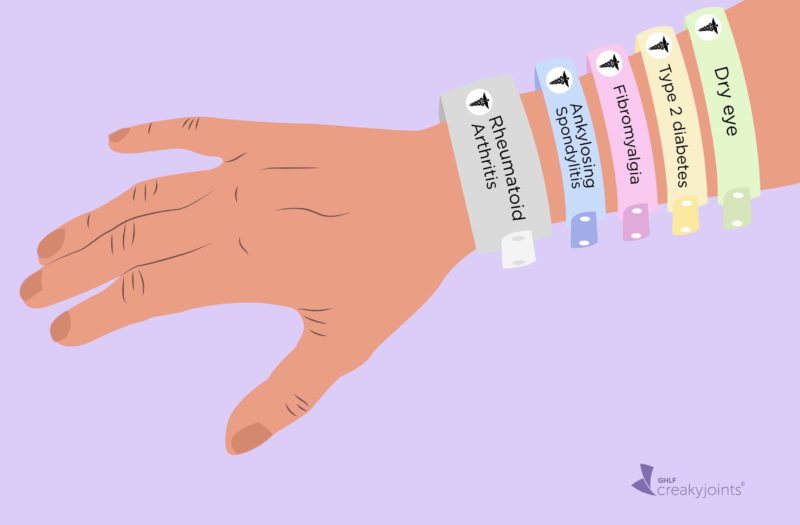

“Chronic illnesses are like chips — you can’t just have one,” says rheumatoid arthritis patient advocate Eileen Davidson. While having two or more health conditions at the same time — what doctors refer to as a comorbidity — tends to be pretty common in our patient community, it doesn’t mean it’s easy.
In one of our recent #CreakyChats, titled “Mo Conditions, Mo Problems,” we asked our community members to get candid about dealing with new diagnoses, managing multiple symptoms and treatment, and coping with the emotional toll of living with multiple conditions.
“There are several difficult parts of living with multiple chronic conditions — understanding which symptom goes with which condition, doctors looking at the complete picture and not just their specialty, noticing something new crop up,” wrote @UnxpctdAdvocate on Twitter. Read more candid responses below — and see which ones resonate most with you.
Navigating Relationships
“Along with managing the unpredictability of the conditions, I find managing relationships difficult. I can be rather unreliable and seem to always have some special need or consideration that gets in the way.” — @Graveleur1
“My health has become so complex that I’m ultra-picky with whom I discuss my conditions more fully. Folks often get overwhelmed and feel sorry for me — with a scared look of pity. Others just don’t care. Others throw out the idea of disability like a cure-all. The few folks left over are the ones who really care. They’re the ones who ask real questions. They’ll look up meds when I say I have to change, they’ll research when I’m diagnosed with something new. They never dismiss my fears, so I’m open and honest and so are they.” — @UnxpectdAdvocate
“It’s been [the] worst just navigating how people around me react. The amount of unsolicited medical advice I get is ridiculous. My friends have been great but family has been ehh.” — @kelseysmigraine
Working with Your Doctor
“When new symptoms arise, it can be hard to know what disease/treatment is causing the new symptom and how to treat it. This results in a lot of time and energy spent talking to each individual doctor to find the culprit.” — @SSkelcher
“Rheumatoid arthritis started it all. I have neuropathy issues as well. Most of my other docs follow the lead of my rheumatologist, including my dentist.” — @DawgPoundHound
“Integration is such a challenge. Specialists may only see their own “slice.” And PCPs — constrained by time, access, training limitations —aren’t necessarily able to really help with the big picture.” — @EileenB29775866
“My quality of life holds the key. And that doesn’t equate to the same thing on a consistent basis. It’s very nebulous. Having a quality relationship with doctors that understand and work together with me is very important.” — @jessupatlarge
The Process of Diagnosis
“It was easy for me — my diagnoses were unrelated, so when symptoms popped up that didn’t fit, I knew there was something else going on.” — @jgchayko
“A few years into my first diagnosis. I know my body and something wasn’t right. Over the years a lot has been unraveled — but my medical teams still baffled some days, and that’s the frustration with autoimmune things — there’s still so much we don’t know.” — @joknighty
Advice for Those Facing New Diagnoses
“You are not crazy, and you are not a hypochondriac. Bring noes, bring records, and bring questions. Advocate for yourself. Be patient and trust yourself.” — @SSkelcher
“Keep living up to your fullest potential, not down to your diagnosis.” — @Arthritis_Coach
“Google is not your friend at first. Your disease course will vary. Don’t freak yourself out with prognosis and scary images.” — @so_irreverent
“Research, ask questions. Talks to your health care team, reach out to community groups, but above all, be patient, give yourself time to adjust, be kind to yourself, reinforce your confidence by asking what is the most generous thing you can say about yourself.” — @jgchayko
Join Our Monthly #CreakyChats
Our monthly, patient-driven Twitter discussion, #CreakyChats, explores topics that are important to the chronic disease community. During a one-hour moderated chat, we provide a space for people to discuss pressing issues facing the arthritis/chronic disease community. You don’t need to be a Twitter pro to join.
During #CreakyChats we encourage everyone to share their strengths, challenges, and experiences — that is how we can help and support people as they navigate life with chronic disease.





